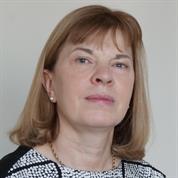Ahead of the start of Facial Palsy Awareness Week (1–7 March 2018), Philippa Tudor FRSA asks Fellows to help spread the word.
Facial palsy is a condition resulting from damage or absence or impairment of the facial nerve that supplies the muscles of facial function and expression. It affects blinking, closing the eye (e.g. to sleep), eating and drinking, speech, smiling and frowning. It has many causes, including disease, injury, stroke, birth trauma, cancer, or neurological condition. The most common is Bell’s palsy, which affects between 12,400 and 24,800 people in the UK each year. While most make a full recovery within two or three months, roughly 20% do not. People aged 15–45 are more prone to getting it, including in particular women in the last three months of pregnancy, and more incidences occur during winter. In the UK there is a 1 in 60 lifetime risk of developing Bell’s palsy.
Despite the large numbers of people affected, the condition is not widely known in the UK. It has received much more publicity in Canada, in part because Jean Chrétien, Prime Minister 1993–2003, has a facial deformity following Bell’s palsy in his youth. In 1993 a political campaigning video featured pictures of Chrétien’s face interspersed with comments including “Is this a Prime Minister?"
and "I would be very embarrassed if he became Prime Minister of Canada".
The video backfired, but among other consequences helped ensure greater awareness of the condition.
Why does the relatively low awareness of facial palsy in the UK matter?
I think there are three main reasons. First, the physical, emotional and psychological consequences of living with facial palsy can be devastating for those affected and their families. Facial difference cannot easily be concealed, and the onset of facial palsy is typically sudden, which can increase the psychological impact. Second, early treatment for facial palsy can significantly improve the long-term outcome for those affected. It therefore really matters that people know this, and where they can get support. Third, it can create unnecessary barriers to employment, from attending job interviews (where inability to smile may be interpreted as a lack of enthusiasm), to performing certain functions (slurred speech may be harder to understand), to straightforward prejudice about placing people with facial difference in roles such as reception or meeting clients. For people with facial palsy expressions such as putting on a brave face, or plucking up the courage to face the day, can have added poignancy.
Can you help raise awareness by informing yourself and others?
Since 2012 a small charity, Facial Palsy UK, has offered support to people affected by facial palsy due to any cause. As well as its ongoing work throughout the year, including support groups run by volunteers (me included) up and down the country, it organises an annual Facial Palsy Awareness Week on 1–7 March. Our calls to action:
- There are lots of useful resources on the Facial Palsy UK website, including free posters to download and helpful leaflets.
- You might want to join the mailing list (again free of charge), or encourage others to do so.
- If you have other ideas or questions do please get in touch with me directly via MyRSA.
Related articles
-
Nine famous female Fellows inspiring inclusion
Dean Samways
International Women’s Day 2024 invites us to imagine a world where all genders enjoy equality. Where prejudice and discrimination no longer exist. This is the world our work is helping deliver to this and future generations.
-
Fellows Festival 2024: changemaking for the future
Mike Thatcher
The 2024 Fellows Festival was the biggest and boldest so far, with a diverse range of high-profile speakers offering remarkable stories of courageous acts to make the world a better place.
-
Inspired by nature
Rebecca Ford Alessandra Tombazzi Penny Hay
Our Playful green planet team summarises a ‘lunch and learn’ at RSA House that focused on how the influence of nature can benefit a child’s development.




Join the discussion
Comments
Please login to post a comment or reply
Don't have an account? Click here to register.
As a sister of someone living with facial palsy, I’ll spread the word about this week to my network.